Sustainable Bedding: A Guide to Natural Fibers

When it comes to bedding, your body deserves to rest on the finest, most supportive material. A material that is soft to the touch, non-irritating, and pleasing to your senses. You may be surprised to learn that many of the materials that fit that description are all-natural. Natural fibers used in bedding are not only better for the environment but have also been shown to help provide higher quality sleep. Natural materials used in bedding include Kapok, Merino Wool, Hemp, and Cotton.
Kapok
Also called “silk cotton,” kapok fibers are the lightest fibers in the world. Sourced from kapok tree seed pods, mainly found in Southeast Asia, this fiber is sustainable, supportive, and hypoallergenic. Kapok feels as soft as cotton, as smooth as silk, and can mimic the flexibility of latex, making it an extremely versatile fiber that’s perfect for premium bedding, especially as an alternative fill for pillows.
Merino Wool
Wool is a common natural fiber that has been used for centuries. Unlike ordinary wool, Merino Wool, derived from Australian Merino sheep, has a finer texture and is known for its thermoregulating properties. This means it can keep you warm during cooler nights while wicking away moisture to keep you cool when it’s warm, making it the perfect year-round fiber. It provides stable support and comfort for bedding that effortlessly adapts to your body while its natural resistance to dust mites creates an ideal sleep space for those with allergies. Finally, this soft wool is fully biodegradable, making it a great sustainable alternative.
Hemp
Hemp is often considered to be one of the most eco-friendly fabric options, derived from hemp plants that return 60-70% of soil nutrients used back to the earth. Beyond sustainability, there are other benefits that make hemp ideal for bedding. Hemp’s natural, relaxed texture softens over time and holds up well due to its durability. Combined with its breathability and thermoregulation, hemp is the perfect material for year-round comfort. It is also naturally hypoallergenic, making it ideal for those with allergies and sensitive skin.
Cotton
Cotton has come to be one of the most popular and sought-after fibers in the textile industry. While we see cotton used as a common fiber in a variety of fabrics, pure, 100% cotton can make a huge difference in terms of benefits. Pure cotton offers a softer, more breathable fabrication as opposed to most cotton blends. It is also hypoallergenic and safe for sensitive skin, making it an ideal fiber for sheets.
As with any type of material, rigorous certifications can ensure quality care and environmental impact are taken into consideration when harvesting natural materials. While some sources of cotton are grown using harmful chemicals, cotton that has been Fairtrade certified ensures rigorous environmental standards are met while also providing better, safer working conditions for cotton farmers. Additionally, cotton certified by the Better Cotton Initiative (BCI) allows cotton communities to thrive while protecting and restoring the environment through a holistic approach to sustainability.
Today’s Health Topics
Editor's Pick
Health Focus
Ask Dr. Weil's Q&A
| sponsor |
| Visit Our Origins Shop! |
| Dr. Weil believes inflammation is the root cause of visible skin concerns like irritation. He also believes mushrooms have the power to fight irritation. That's why he partnered with Origins to create these Mega-Mushroom Formulas. |










